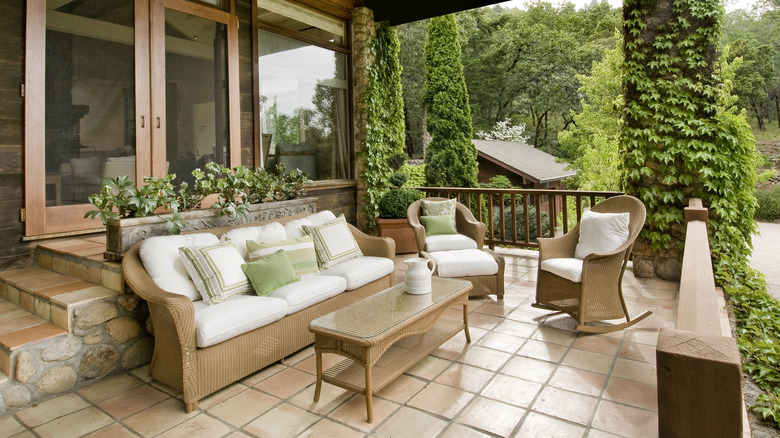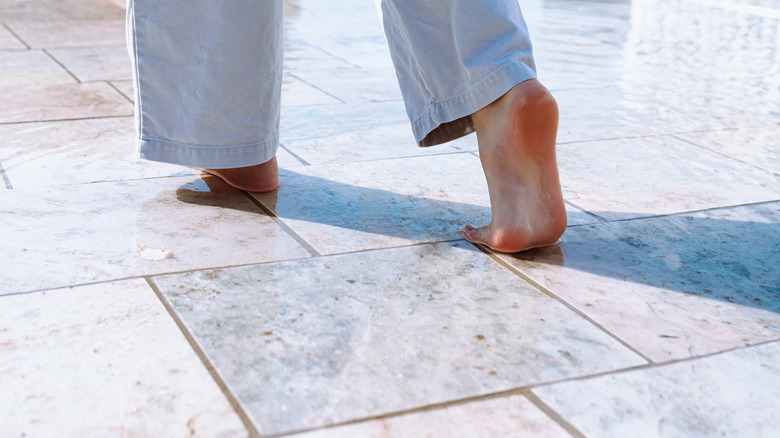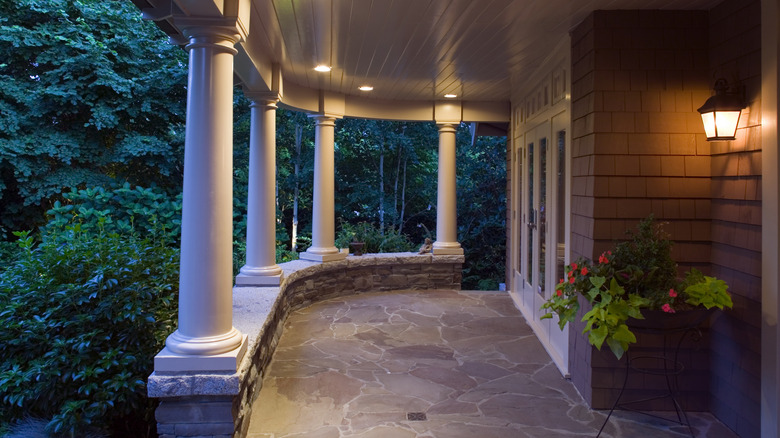The One Type Of Tile You Shouldn't Use On Your Backyard Patio
A beautiful porch is a true asset to a home, and one way to enhance the look of your outdoor space is to install unique hardscape flooring. Tile is a classic and timeless material anywhere in your residence, but not many people realize you can also use tile on exterior surfaces! Whether you're beautifying your backyard patio, building a poolside space, or installing an outdoor shower, tile should certainly be a consideration in your design. Unfortunately, not every kind of tile is up to the task. Some materials can withstand heat, frost, sunlight, and temperature changes, while others can become a downright hazard. One example is glazed ceramic tile, which shouldn't be used on patios because it can become extremely slippery when wet.
While it might not seem like a serious risk, ceramic tiles are one of the most commonly slipped-on flooring materials. To create a safe outdoor space, learn more about why glazed ceramic tile is just an accident waiting to happen and what alternatives you can use instead to elevate the design without risk.
Skip the glazed ceramic
Any kind of porcelain or ceramic tile can become slippery, but glazed ceramic can be particularly dangerous. This material is made by firing clay into the desired shape, then coating its surface in a thin layer of molten glass. When the glass cools, it creates a lovely, smooth, and shiny face, but the glass also makes ceramic tile very slick. When it's used indoors, you can do more to control spills and wet spots. However, you'll have to compete with rain, humidity, and misdirected droplets from watering plants when installed outside. Even accumulated dust can make ceramic feel slick. And if the tiles are slippery when wet or dusty, you can bet they'll be even more dangerous under icy conditions.
According to the National Floor Safety Institute, approximately 1 million people visit the emergency room yearly due to slipping and falling. Slipping on ice can be even worse, accounting for 1 million injuries and over 17,000 deaths every year (via Ogborn Mihm). The odds of slipping on wet or icy floors are higher among adults age 65 and older, but even if you don't have elderly folks living in your home, slick tile floors can still present a serious risk for bone fractures, concussions, and death.
Safer alternatives to ceramic tile
While ceramic tiles may look beautiful, it's not worth risking your health and safety to have an appealing porch. Plus, plenty of other materials look great and provide better traction underfoot! Natural stones like flagstone are a classic, luxurious option, while brick and textured tiles can be a fun change from typical concrete. Additionally, you don't have to build a wood deck to achieve a charming and cozy look. Another trendy flooring option for your outdoor space could be wood-slatted tiles or mats. Wood tiles look great when used to section off a seating area, outdoor bar, or balcony.
If you have members in your household with a high fall risk or your patio is frequently splashed by rain and water, consider using outdoor rubber tiles to fill out the space, provide a strong foot grip, and cushion the floor. Rubber tiles are also resistant to UV damage and won't crack under frost and heat, so they'll last for years on your patio or in your garden. Whatever material you decide to use, make sure it's safe for the climate and temperature range in your area, and watch closely for any cracks, chips, or slippery spots. If you already have ceramic porch tiles but don't wish to remove them, use large outdoor rugs to provide traction and minimize the risk of slipping.


